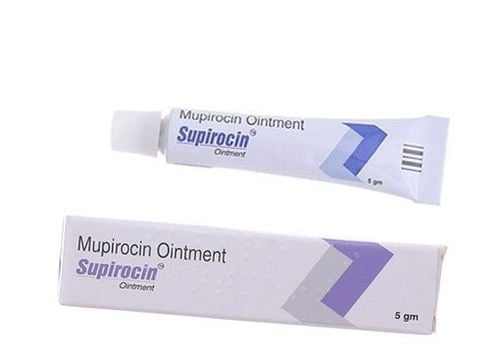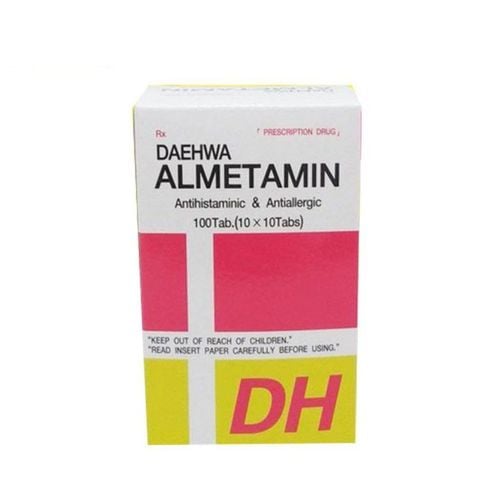Allermine 4mg drug is made in the form of tablets, with the active ingredient Chlorpheniramine Maleat. The drug is indicated for the treatment of acute and chronic allergic diseases of the respiratory tract.
1. Uses of Allermine 4mg
What is Allermine 4mg? Allermine 4mg contains Chlorpheniramine Maleate, a first-generation antihistamine that competitively blocks H1 receptors in target cells. Chlorpheniramine Maleate has anticholinergic side effects and is also used to treat nasal discharge, although this effect varies among individuals.
Indications for Allermine 4mg include:
- Respiratory allergic conditions (acute and chronic): Seasonal rhinitis, allergic rhinitis, etc.
- Other allergy symptoms are contact dermatitis, urticaria, food or drug allergies, Quincke’s edema, and itching due to measles or chickenpox.
Contraindications for using Allermine include:
- Hypersensitivity to any component of the drug;
- Acute asthma attack;
- Prostatic hypertrophy;
- Narrow-angle glaucoma;
- Bladder neck obstruction;
- Peptic ulcer or pylori duodenal obstruction;
- Pregnant or breastfeeding women, neonates, or premature infants;
- Patients taking monoamine oxidase (MAO) inhibitors within 14 days of using Chlorpheniramine, as its anticholinergic effects are enhanced by MAO inhibitors.
2. How to use and dosage of Allermine 4mg
Method of administration: The drug is taken orally.
Dosage:
- Children under 6 years: Use only under a doctor’s guidance.
- Children aged 6-12 years: 1 tablet once or twice daily.
- Children over 12 years and adults: 1 tablet 3-4 times daily.
Overdose: The lethal dose of Chlorpheniramine is approximately 25-50 mg/kg body weight. Overdose symptoms include: Central nervous system stimulation or depression, Seizures, Psychotic episodes; Respiratory failure; convulsions, Dystonic reactions; Arrhythmias, cardiovascular collapse; Anticholinergic effects. Treatment includes symptom management and life-support measures, focusing on liver, kidney, heart, respiratory function, and electrolyte balance.
Gastric lavage or induced vomiting with ipecac syrup may be performed. Activated charcoal and cathartics may also be used. Seizures may require intravenous diazepam or phenytoin. In severe cases, blood transfusion may be necessary. In emergency or overdose situations, patients should immediately go to the hospital or call for emergency medical help.
Missed Dose: Take the missed dose as soon as remember . If it is almost time for the next dose, skip the missed dose and resume the regular schedule. Do not double doses.
3. Side effects of Allermine
Common side effects of Allermine include: Sedation (mild drowsiness or deep sleep), Dry mouth, Dizziness, Loss of appetite, and Nausea. If side effects occur, stop using the drug and promptly inform a doctor or visit the nearest hospital for appropriate management.
4. Precautions when using Allermine
Key precautions when using Allermine:
- Chlorpheniramine’s sedative effects increase when combined with alcohol or other sedatives.
- Allermine may cause drowsiness; avoid use when driving or operating machinery.
- The anticholinergic side effects of Allermine increase the risk of urinary retention, particularly in individuals with prostatic hypertrophy, pylori duodenal obstruction, or urinary tract obstruction, and may worsen myasthenia gravis.
- Use in pregnant women should be restricted to essential cases only, as used during the third trimester may cause seizures in newborns.
- Chlorpheniramine may pass into breast milk and suppress lactation. Since antihistamines can cause severe reactions in breastfed infants, consult a doctor to decide whether to discontinue breastfeeding or the medication.
5. Drug interactions with Allermine
Key drug interactions with Allermine include:
- Monoamine oxidase inhibitors (MAOIs): Prolong and enhance Allermine’s anticholinergic effects.
- Ethanol or sedative drugs: Increase the central nervous system depressant effects of Chlorpheniramine.
- Chlorpheniramine inhibits phenytoin metabolism, potentially causing phenytoin toxicity.
Patients should inform their doctor about all medications they are currently taking and their medical history. Always follow the doctor’s instructions during treatment.
Allermine 4mg tablets contain Chlorpheniramine Maleate and are indicated for the treatment of acute and chronic respiratory allergic conditions. To ensure effective treatment and minimize potential side effects, patients should use Allermine only under medical guidance or after consulting a doctor or pharmacist.
To arrange an appointment, please call HOTLINE or make your reservation directly HERE. You may also download the MyVinmec app to schedule appointments faster and manage your reservations more conveniently.













